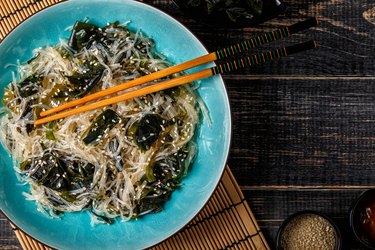
Traditional to Asian cuisine, kelp noodles are most commonly found in Korean cooking, where the light taste and springy texture of the noodles take well to the rich and fragrant sauces of the cuisine. Kelp noodles nutrition includes important vitamins and minerals, as well as fiber.
Made from a brown seaweed that grows in deep waters, kelp noodles can be purchased in Asian grocery stores and some health food stores. Like all kelp and kelp products, they are safe for human consumption.
Video of the Day
Video of the Day
Tip
Kelp noodles nutrition includes important vitamins and minerals, as well as fiber.
Get Your Vitamins and Minerals
To make kelp noodles at home, you need to purchase dried or raw kelp, also known as kombu, grind it into a flour or paste and mix with fresh water and salt. The gummy compounds in kelp help the noodles achieve their springy texture. It takes 1 cup of fresh kelp to make a 1/2-cup serving of kelp noodles. Kelp noodles are rich in a number of nutrients, namely calcium, iron and vitamin K, especially given the small serving size of noodles.
According to the USDA, a 1/2-cup serving of kelp noodles has:
- 336 milligrams of calcium
- 5.7 milligrams of iron
- 132 micrograms of vitamin K
Read more: Hazards of Eating Nori Seaweed
Fiber in Kelp Seaweed Noodles
A 1/2-cup serving of kelp noodles has 1 gram of dietary fiber, a good quantity given the small serving size. Kelp noodles can help you meet the 25 to 38 grams of dietary fiber recommended per day, according to Mayo Clinic. A diet high in fiber reduces your chances of heart disease and can help relieve symptoms of constipation and diverticulosis.
Dietary fiber also adds bulk to your diet, making you feel fuller on fewer calories, reducing the risk of overeating.
Consider Kelp for Weight Loss
Compared to other noodle choices, such as spaghetti, kelp noodles are low in calories and can help with weight loss. A 1/2-cup serving of kelp noodles has 43 calories per serving and less than half a gram of fat, according to the USDA.
A 1/2-cup serving of cooked, enriched spaghetti has 115 calories per serving and a little more than half a gram of fat. Substituting kelp noodles for spaghetti means a calorie deficit of 72 calories. Using kelp noodles in place of spaghetti even just twice a week for a year could help you lose over 2 pounds of body weight.
Read more: Is Seaweed Salad Healthy?
Watch the Salt
Be sure to check your kelp noodles nutrition label — they are naturally high in sodium. A 1/2-cup serving of kelp noodles has 233 milligrams of sodium. A diet high in sodium can increase your risk of heart disease, and most Americans already have a diet that is too high in sodium.
The recommended intake is a maximum of 1,500 milligrams for people with a history of heart disease, who are African-American or who are over the age of 50. For all others, the recommended maximum intake is 2,300 milligrams per day, according to the American Heart Association.
To keep your kelp noodles as low as possible in sodium, do not use added salt. If you buy dried kelp, soak the seaweed until it is supple before making the noodles, throwing away the soaking liquid to further reduce the amount of sodium in your noodles.
- Mayo Clinic: "Dietary Fiber: Essential for a Healthy Diet"
- USDA National Nutrient Database: "Spaghetti, Protein-Fortified, Cooked, Enriched"
- American Heart Association: "How Much Sodium Should I Eat Per Day?"
- USDA FoodData Central: "Seawood, Kelp, Raw"
- USDA FoodData Central: "Spaghetti, Protein-Fortified, Cooked, Enriched (n x 6.25)"
- U.S. Department of Agriculture: Spaghetti, Cooked, Enriched, No Added Salt